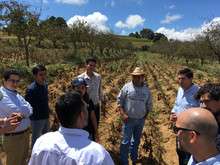Contract fruit growing as a key success factor for fruit preparations
In order to better manage and utilize procurement synergies, the procurement of fruits is the central responsibility of AGRANA Fruit Services GmbH. This subsidiary is the central fruit purchasing organisation for the Fruit segment and active in all major fruit growing regions in a total of 48 countries.
AGRANA’s key global advantage lies in sourcing frozen fruit directly from producers and under contractual growing agreements, which are also increasing in importance in the Fruit segment. Contract growing combined with advisory support for growers increases food safety by means of simplifying quality control and guaranteeing end-to-end traceability in the food chain, a factor which is particularly relevant in the increasing important organic market segment. In order to be able to optimise the commercial, ecological and also the social aspects of the supply chain and their traceability, AGRANA also operates its own processing plants (the first transformation step) in Morocco, Mexico, Poland and Ukraine, where the freshly harvested fruit is sorted, cleaned and frozen. Overall, around 40 percent of the fruit processed by AGRANA either undergoes the first transformation step in the group's own facilities or is sourced from exclusive contractual partners.
In the 2018|19 financial year, in response to the demand for regionally and sustainably produced apples for fruit preparations, AGRANA’s fruit preparations division launched a project in the Mexican state of Puebla to professionalise apple cultivation in this region (where apples have been grown commercially since the 1940s) in line with sustainability criteria. In the three communities of Zaragoza, Zacatlan and San Salvador el Seco, about 200 kilometres east of Mexico City, more than 50% of the 120,000 inhabitants live in poverty. In the past, as it was no longer possible to earn a living with the less professional apple cultivation, existing orchards were cleared and the land used to produce other, less suitable crops such as potatoes. This change in land use led to soil erosion and nitrate pollution of the groundwater, and in addition the required heavy use of pesticides made crop rotation after potatoes difficult.
As part of this project, which is scheduled to run until 2025, AGRANA will support interested farmers by providing know-how and purchase guarantees in order to create jobs and generate income through sustainable apple production that improves the soil and biodiversity. Specifically, training courses in tree pruning, fertilisation and tree health as well as in farm and environmental management will be conducted to prepare the participating growers by 2025 to meet the sustainability criteria for FSA silver status specified by SAI Platform. The crops from the approximately 175 hectares of apple orchards foreseen for the project will directly or indirectly benefit about 5,000 people.
Mexico
In August 2013 AGRANA started a project to promote the certification of strawberry and blackberry suppliers in Jacona, Mexico, to the Rainforest Alliance (RA) standard. With the support of the local AGRANA agricultural extension team, the participating supplier farms were able to improve cultivation practices, introduce water and waste management, implement safety and health measures for their more than 2,000 employees and be certified to the RA standard. The suppliers benefited not only through the higher competitiveness resulting from the certification but also by their added popularity as employers. AGRANA was pleased to be recognised for its engagement with an award as one of the best three companies in Mexico – and the best in berry processing – in the areas of agricultural practices and food safety; the distinction was awarded by Primus GFS, a global initiative for food safety.
Regenerative agriculture in fruit farming
In the 2022|23 financial year, the fruit preparations business expanded the guide for regenerative practices in fruit farming developed in the previous year by adding a scorecard, designed to render progress in regenerative fruit production measurable based on the agricultural practices used by growers. The guide was also made available online to share knowledge and promote its application. Since its publication, it has been downloaded by customers, suppliers, NGOs and research institutions.
In the year, AGRANA’s fruit preparations business entered into partnerships with a blueberry producer in Canada and a strawberry grower in Mexico that, in pilot projects, will implement regenerative practices for these bush and ground crops. The operator in Canada is already advanced in the application of regenerative techniques and has for some time been employing minimally invasive soil tillage, cover crops and mulching. Using the Cool Farm Tool (a calculator that helps growers optimise their practices to reduce GHG emissions), a negative CO2 balance, improved soil health and increased species diversity were documented for this Canadian operation. In 2023|24 the fruit preparations business will establish a pilot farm for regenerative practices for strawberry growers in Mexico.
